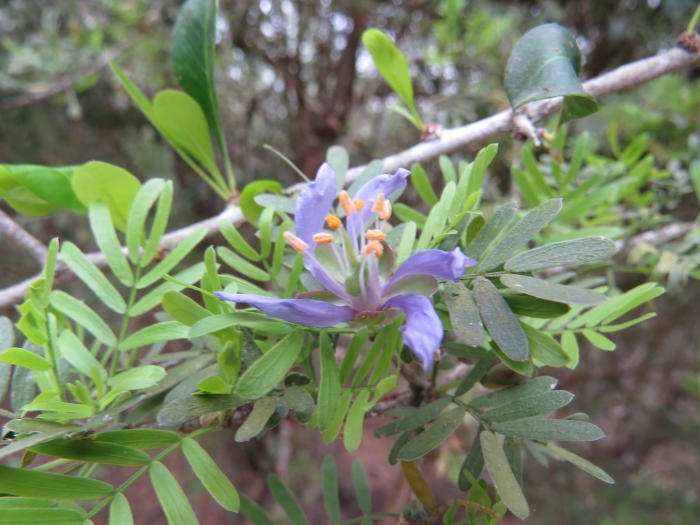Texas Guaiacum
(Guaiacum angustifolium)
Texas Guaiacum (Guaiacum angustifolium)
/
/

johnyochum
CC BY 4.0
Image By:
johnyochum
Recorded By:
Copyright:
CC BY 4.0
Copyright Notice:
Photo by: johnyochum | License Type: CC BY 4.0 | License URL: http://creativecommons.org/licenses/by/4.0/ | Rights Holder: johnyochum | Publisher: iNaturalist | Date Created: 2016-03-06T09:04:08-08:00 |




















































Estimated Native Range
Summary
Guaiacum angustifolium, commonly known as Texas guaiacum, Texas lignum-vitae, soapbush, and huayacán, is an evergreen shrub or small tree native to the Chihuahuan Desert and Tamaulipan mezquital ecosystems. It thrives in arid environments, typically found in limestone soils, and is well-adapted to hot, dry climates. This species can reach up to 7 meters (23 feet) in height and is characterized by its dense canopy and short lateral branches. The bark is rough and dark, providing an interesting texture in the landscape.
The plant’s small, showy blue to purple flowers measure 12–22 mm (0.47–0.87 in) in diameter, with five sepals and petals around 1 cm (0.39 in) long, and ten stamens. The blooming period extends from March to September, with flowers emerging after rainfall, attracting pollinators such as bees and butterflies. Texas guaiacum is valued for its drought tolerance and low water requirements, making it suitable for xeriscaping and as an ornamental in water-conserving gardens. It prefers full sun to part shade and thrives in well-drained soils, especially those with a limestone base. While it is not commonly used in urban plantings, it can serve as a unique specimen in rock gardens or as part of a native plant landscape. Potential problems include root rot if overwatered and susceptibility to pests such as borers if stressed.CC BY-SA 4.0
The plant’s small, showy blue to purple flowers measure 12–22 mm (0.47–0.87 in) in diameter, with five sepals and petals around 1 cm (0.39 in) long, and ten stamens. The blooming period extends from March to September, with flowers emerging after rainfall, attracting pollinators such as bees and butterflies. Texas guaiacum is valued for its drought tolerance and low water requirements, making it suitable for xeriscaping and as an ornamental in water-conserving gardens. It prefers full sun to part shade and thrives in well-drained soils, especially those with a limestone base. While it is not commonly used in urban plantings, it can serve as a unique specimen in rock gardens or as part of a native plant landscape. Potential problems include root rot if overwatered and susceptibility to pests such as borers if stressed.CC BY-SA 4.0
Plant Description
- Plant Type: Tree, Shrub
- Height: 6-20 feet
- Width: 6-12 feet
- Growth Rate: Slow
- Flower Color: Purple
- Flowering Season: Spring, Summer
- Leaf Retention: Evergreen
Growth Requirements
- Sun: Full Sun, Part Shade
- Water: Low
- Drainage: Fast
Common Uses
Bee Garden, Butterfly Garden, Deer Resistant, Drought Tolerant, Low Maintenance, Potted Plant, Showy Flowers
Natural Habitat
Native to the Chihuahuan Desert and Tamaulipan mezquital ecosystems
Other Names
Common Names: Texas Guaiacum, Soapbush, Huayacán
Scientific Names: , Guaiacum angustifolium, Porlieria angustifolia, Guajacum angustifolium,
GBIF Accepted Name: Porlieria angustifolia (Engelm.) A.Gray